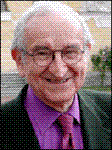
Born: 1926, Warsaw, Poland
Comments. Sir James Stirling commented on Rykwert’s The First Moderns, for example, that it was: ‘An erudite lead into my favourite period (early nineteenth century) with amazing revelations on the architectural heroes of the time.’
Early days.. Father- Szymon Rykwert , mother-Elzbieta Melup, moved to England in 1939, on the eve of the WWII. Rykwert was educated at Charterhouse and then at the Bartlett School of Architecture (University College, London) and the Architectural Association in London.
Career. His first academic posts were lecturing at Hammersmith School of Arts & Crafts and subsequently at the Hochschule für Gestaltung in Ulm, Germany from 1958, and then as Librarian and Tutor at the Royal College of Art from 1961 to 1967 where he obtained his PhD. He was appointed Professor of Art at the University of Essex, England a post he held from 1967 until 1980, when he moved to Cambridge first as Slade Professor in the Fine Arts and then as Reader in architecture. Here Rykwert continued his influential master’s program, taught with the architectural critic Dalibor Vesely. In 1988 Rykwert was appointed as the Paul Philippe Cret Professor of Architecture at the University of Pennsylvania, USA a post he held until 1998 (now Emeritus). Joseph Rykwert has lectured or taught at most major schools of architecture throughout the world and has held visiting appointments at Princeton University, Princeton, New Jersey; the Cooper Union, New York City, New York; Harvard Graduate School of Design,Cambridge, Massachussetts; the University of Sydney, Sydney, Australia; Universite Catholique de Louvain, Louvain-la-Neuve, Belgium; L’Institut d’Urbanisme, Paris, France; the Central European University, Budapest, Hungary and others. In 1998-99 he was a British Academy visiting professor at the University of Bath. He has held senior fellowships at the Center for Advanced Studies in the Visual Arts, Washington, and the Getty Center for the History of Art and the Humanities. His work is fundamentally concerned with the origin of architectural ideas and, having experienced displacement himself at an early age, with our sense of ‘place’. The range of Rykwert's learning is enormous. History of gardens, Chinese influences, festival architecture, all contribute to the overflowing wealth. Great figures in the history of thought and science — Bacon, Newton, Vico — are seen from new angles. Throughout his career Rykwert has been preoccupied with the work of one Renaissance architect in particular, that is, Leon Battista Alberti. Rykwert is the author of many influential works of architectural criticism and history, which have been published over a sixty-year period. The most important of these are The Idea of a Town (1963), On Adam’s House in Paradise (1972), The Dancing Column (1996), The Seduction of Place (2000) and his latest book, The Judicious Eye: Architecture Against the Other Arts, published in 2008. Many of Rykwert’s former pupils have gone on to have significant careers in their own right, such as Daniel Libeskind, Eric Parry, Alberto Pérez-Gómez, Mohsen Mostafavi, Robert Tavernor, Vaughan Hart and David Leatherbarrow.
Personal. Rykwert married his second wife, Anne, during his time in Essex, and she has been a collaborator on notable works including the international Alberti exhibition and a book on the Adam brothers.
Prizes and awards. 1984 - appointed Chevalier dans l’ordre des Arts et des Lettres, France,the Alfred Jurzykowski Foundation award (1989), Honorary degrees: the University of Edinburgh, United Kingdom (1995), the University of Cordoba, Argentina (1998), the University of Bath, United Kingdom (2000), the University of Toronto, Canada (2005), the University of Rome, Italy (2005), the university of Trieste, Italy (2007), and is a member of the Italian Accademia di San Luca and the Polish Academy of Sciences. In 2000 he was awarded the Bruno Zevi prize in architectural history by the Biennale of Venice, and in 2009 the Medalla al Merito de las Bellas Artes, Madrid, Spain. He has been president of the international council of architectural critics (CICA) since 1996.
This article uses mostly material from the Wikipedia article "Joseph Rykwert." Text is available under the Creative Commons Attribution-ShareAlike License; additional terms may apply:
Wikipedia
http://www.readysteadybook.com/Article.aspx?page=josephrykwert
http://www.readysteadybook.com/Article.aspx?page=josephrykwert
Other sources:
Interview
Univ.of Cottbus biography
Return to home page:
Prominent Poles